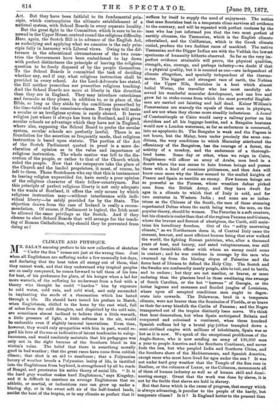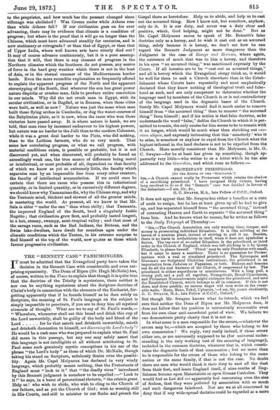CLIMATE AND PHYSIQUE.
MR. SALA'S amusing preface to his new collection of sketches "Under the Sun" comes out just at the wrong time. Just when all Englishmen are suffering under a few unusually hot days, and declaring that the heat takes all energy out of them, that they cannot work, and that they understand why tropical peoples are so easily conquered, he comes forward to tell them of his love for heat, of his preference for glare, of his hunger when a lad for more warmth, of the suffering he underwent from a fool with a theory who thought he could " harden " him by exposure to cold water, cold rain, and cold wind, and only succeeded in implanting the seeds of a rheumatism which has lasted through a life. He should have issued his preface in March, when Englishmen, chilled to the bone by the east wind, full of aches from the cold draughts, and dispirited by the cold rain, are sometimes almost inclined to believe that a little warmth, a little pressure of light, a little softness in the air, would be endurable even if slightly immoral innovations. Even then, however, they would only sympathise with him in part, would re- gard his love of the sun as indicative of latent tendencies to volup- tuousness, and would resolutely maintain that his pedagogue was only not in the right because of the Southern blood in his victim's veins. The belief that there is something morally good in bad weather ; that the great races have come from coldish climes ; that sleet is an aid to manliness ; that a Polynesian luxury of weather breeds a Polynesian laxity of life, is instilled into the Englishman from boyhood, is strengthened by all he reads of Bengal, and penetrates his entire theory of social life. " It is the hard grey weather makes hard Englishmen," says Kingsley, and it is difficult to convince an average Englishman that an athletic, or martial, or industrious race can grow up under a blazing sky, or in the sweet soft air of the half-heated lands, amidst the heat of the tropics, or in any climate so perfect that it suffices by itself to supply the need of enjoyment. The notion that man flourishes best in a temperate clime survives all evidence to the contrary, and will be repeated with perfect coolness by the man who has just informed you that the two most perfect of earthly climates, the Tasmanian, which is the English climate etherialised, and the Californian, which is the Greek climate cooled, produce the two feeblest races of mankind. The native Tasmanian and the Digger Indian are with the Veddah the lowest specimens of humanity hitherto observed. So far as the very im- perfect evidence attainable will prove, the physical qualities, strength, size, courage, and perhaps industry—we doubt if that is a physical quality, but it is counted as one—are independent of climate altogether, and specially independent of the thermo- meter. The biggest and strongest race of earth, the Nubian of the Upper Nile, flourishes in a heat which almost boiled \Verne, the traveller who has most carefully ob- served his wonderful muscular development, and can live and grow fat in stoke-rooms from which the most powerful English- men are carried out fainting and half dead. Kaiser William's Pomeranians are scarcely the equals of these men in physique, and are not when they choose more steadily industrious. A humal of Constantinople or Cairo would carry a railway porter on his shoulders and all his luggage besides, and a Bengalee boatman would row a London waterman, as far as endurance is concerned, into an apoplectic fit. The Bengalee is weak and the Peguan is not brave, but the Malay, born under precisely the same con- ditions, the very conditions to which Macaulay attributed the effeminacy of the Bengalees, has the courage of a ferret, the activity of a monkey, and the endurance of a thorough- bred horse. Some day or other, when we reign in Cairo, Englishmen will officer an army of Arabs, men bred in a desert where the sun seems to hate human beings and pursue them with a kind of conscious pitilessness, and then Asia will know once more why the Moor seemed to the mailed knights of France and Spain so terrible an enemy. Few human beings are so powerful as the Parsees, whose wrestlers defeat picked men from the British Army, and they have dwelt for ages in a climate to which that of Italy is cold, and for two centuries in Western India ; and none are so indus- trious as the Chinese of the South, the men of those steaming superheated Deltas where the earth being water, the men, on the popular theory, should be women. The Peruvian is a soft creature, but his climate is cooler than that of the regions Panama and Guiana, where the bravest and fiercest of aborigines, the Carib, still main- tains his hereditary freedom. Out of the "softly enervating climate," as we Northerners deem it, of Central Italy came the sternest, bravest, and most efficient human being that ever walked the world, the fighting Roman patrician, who, after a thousand years of heat, and luxury, and sated voluptuousness, was still the most formidable officer with whom an enemy could come in contact ; and he was outdone in courage by the men who swarmed up from the blazing slopes of Palestine and the fierce heat of ldumea to defend the Holy City. The Scotch and the Swedes are confessedly manly people, able to toil, and to battle, and to endure ; but they are not manlier, or braver, or more enduring than the planters bred in those sweltering rice swamps of South Carolina, or the hot " barrens " of Georgia, or the hotter lagoons and morasses and flooded jungles of Louisiana, where upon all accepted conditions men ought to degen- erate into cowards. The Delawares, bred in a temperate climate, were not braver than the Seminoles of Florida, or so brave as their far-away kinsfolk the Caribs of Panama ; and the Negro transported out of the tropics distinctly loses nerve. We think that heat demoralises, but when Spain anticipated Britain and conquered and colonised a continent, when three hundred Spanish ruffians led by a brutal pig-jobber trampled down a semi-civilised empire with millions of inhabitants, Spain was as hot as it is now. We speak of the exceptional prolificness of the Anglo-Saxon, who is now sending an army of 100,000 men a year to people America and the Southern Continent, and never feels the loss, but who peopled India and Southern China, and the Southern shore of the Mediterranean, and Spanish America, except races who must have lived for ages under the sun ? It was not under hard grey weather that the Temple of the Sun rose in Baalbec, or the columns of Luxor, or the Coliseum, monuments all of them of human industry as well as of human skill and domi- neering energy. Grant that the work was done by slaves, it is not by the feeble that slaves are held in slavery.
But that force which is the cause of progress, that energy which is always advancing, is peculiar to the people of the hardy, but temperate climes? Is it ? Is England hotter to the peasant than to the proprietor, and how much has the peasant changed since villenage was abolished? Was Greece cooler while Athens rose than while Athens fell ? If our civilisation goes on for ever advancing, there may be evidence that climate is a condition of progress; but where is the proof that it will go on longer than the Chinese, which must have advanced steadily for centuries, and is now stationary or retrograde? or than that of Egypt, or than that of Upper India, where well known arts have utterly died out? It may of course advance continuously, but it is a pure assump- tion that it will, that there is any element of progress in the Northern climates which the Southern do not possess, any source of force in the hard grey weather which there is not in the heat of Asia, or in the eternal summer of the Mediterranean border lands. Even the more recondite explanation so frequently offered to explain the apparent progress of the North and the apparent stereotyping of the South, that wherever the sun has great power nature dispirits or crushes man, fails to produce entire conviction in our minds. Why did she not crush man in Egypt, with its secular civilization, or in Bagdad, or in Benares, when those cities were built, as well as now ? Nature was just the same when man built those flying arches in Cambodia, or dug the water-courses of the Babylonian plain, as it is now, when the races who won those victories have passed away. It is where nature is harsh, we are told, that man rises by incessant endeavour to his highest powers, but nature was no harder to the Julii than to the modern Colonnas, while it was a great deal harder to the Picts, who did nothing, than to the Lothian farmers, who do so very much. That some law correlating progress, or what we call progress, with material conditions exists, is possible or probable, but it is not discovered yet, and when discovered, will probably be found an exceedingly weak one, the true source of difference being moral or intellectual, or most probable of all, dependent on that faculty of which we know as yet so extremely little, the faculty which separates man by an impassable line from every other creature, the faculty of intellectual accumulation. If we could once be certain that there are races who possess this in infinitesimal quantity, or in limited quantity, or in excessively different degrees, we should know why Tasmanians die, why the Chinese stop, and why the Teutonic mind, thickest and slowest of all the greater minds, is mastering the world. At present, all we know is that Mr. Sala is abler "under the sun" than when chilly ; that Tasmania, the improved England of the South, bred a singularly feeble Negrito ; that civilisation grew first, and probably lasted longest, in a hot, steamy, swampy, semi-tropical valley ; and that most of the savage races, such as the Red Indians, the Britons, and the Swiss lake-dwellers, have dwelt for countless ages under the climatic conditions which the Teuton, in his extreme surprise to find himself at the top of the world, now quotes as those which favour progressive civilisation.



































 Previous page
Previous page